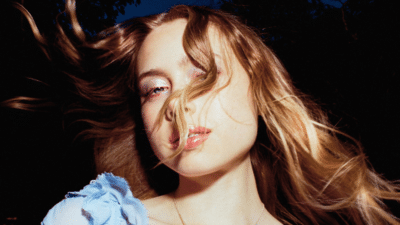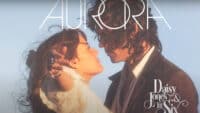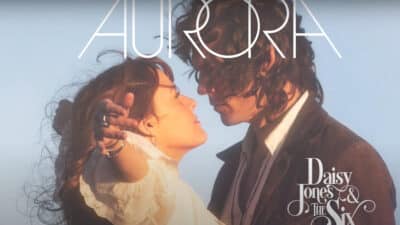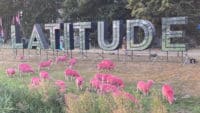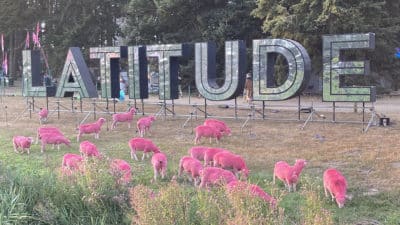Interview

Interview
Greta Van Fleet: “Music is in my DNA. It just made sense”
Jake Kiszka on getting invited to Elton John’s house, being knighted by Robert Plant and turning Greta Van Fleet into one of the biggest rock bands on the planet
The city of Frankenmuth, Michigan is home to less than 5,000 people. Two hours north of Detroit, the snowy little Bavarian community is famous for two things: the world’s largest Christmas store and the Kiszka brothers.
Josh, Jake and Sam Kiszka grew up listening to Led Zeppelin, The Who and The Rolling Stones before starting a band in their teens – naming themselves after a local Frankenmuth woman (who apparently prefers Polka music). Lead guitarist Jake wrote the riff for ‘Highway Tune’ aged 14, and a few short years later he was playing it at Elton John’s Oscar party, opening for Guns N’ Roses and winning a Grammy for Best Rock Album.
As Greta Van Fleet prepare to bring their blockbuster world tour to the UK (and before they head back to the States to co-headline a string of dates with Metallica), the now 26-year-old Jake Kiszka tells us what it’s like to front the biggest smalltown band in the world.
How have you been finding the crowds in Europe? This is your first time back in a long while isn’t it?
It’s been three years. The crowds are spectacular actually. Especially in Europe, for some reason, it seems like there’s a sort of mass joyful celebration going on all the time. I think everybody’s happy to be back.
You released your last album, The Battle At Garden’s Gate, in the middle of the pandemic. Was there a worry at the time that you might not get to tour like this again?
Definitely. There was a worry that we wouldn’t be able to tour in the same grand capacity. I remember we were looking at creating alternative platforms to put the music out and reach the people, but luckily the timing worked out. It’s been about a year and a half or so now since the record came out so it feels right now I think.
Some of the songs you play on tour were written when you were still in school… What’s your relationship with those early tracks now?
It’s interesting, for me, personally, I have a lot of respect for the stuff that we did when we were much younger. Those songs have been a part of my journey from the very beginning, so they will always have a presence in the evolution and growth of my career, you know? But I think the songs themselves have evolved too, so the meaning sort of changes when I play them. It’s sort of like saying hello to an old friend, again, I guess.
What were you all like as kids? Was fame always part of the dream back in Frankenmuth?
Not necessarily, no. I mean, I always played guitar. I started playing when I was three. So it was something that was sort of always a part of my genetics in a way, part of my DNA, so I suppose music was sort of the course of least resistance for me. It just made sense. I’d always wanted to put a group together, from when I was really young, but I’d never envisioned that it would be with my brothers. But again the easier path took over. We grew up together and we shared all these influences so it sort of felt natural that we ended up playing music together. But then everything just blew up. And I don’t think any of us expected that to happen.

This was around 2017, right? When ‘Highway Tune’ was getting played everywhere and you started winning awards for your first EP. By the end of that year were opening for Bob Seger and everyone was talking about the album you hadn’t written yet. What do you remember about that time?
It all happened so profoundly and so quickly, and with such gravity, at such an early stage. It just kind of just took off. It was overwhelming in the sense that we didn’t know what to expect, or what we needed to do. We needed to quickly learn how to adapt. We were instantly submerged.
Around that time you started touring with The Struts. Was that a helpful experience? What did you learn from them about what it took to be a live band?
It’s interesting because that sort of evolution is continually growing, even today. There’s still a learning curve. But I think you’re right – the majority of that curve came really early on for us, touring with other groups. So we learned what you do to take care of yourself. How to function. And also the other side of things, where you get into the industry and politics side of music.
Soon after you got asked to play Elton John’s Oscar party. What was that phone call like?
It was surreal. It was unbelievable. Someone of that prestige, of that legendary status… someone who has been on this Earth making music 50 plus years before we were born, who’s music we grew up listening to… And then all of a sudden you’re on the receiving end of a phone call where the Rocketman is talking to you, asking you to come and perform. I answered that call. I was like, ‘hey boys, it’s Elton’, and then we just sat there for about 15 seconds of awkward silence because no one knew what to say. But it was great. You know, we’ve become good friends with Elton now, but it’s still pretty surreal.
You’ve spoken before about Elton’s advice to you, telling you to ‘flaunt what you’ve got’, and how the band’s image changed afterwards. How important is showmanship to you now when you’re onstage?
I mean, it’s sort of everything. There’s a visual representation to the sonic quality of our music. And I guess that’s a huge part of it. Artists try to influence or affect other human beings, right, to elicit a response from sight, and taste and smell and touch and hearing. So the visual side of our music is just a very large component to sort of who we are. People like Elton, and like the old masters, laid the groundwork for that.
You recently got another important endorsement too – when Robert Plant named Greta Van Fleet ‘Led Zeppelin I’ in an interview. That must have been a huge moment for you all too?
Oh, absolutely. It’s the same thing as Elton. To hear that sort of reaffirmation from the old masters feels like the permission we need to go forward, you know, to keep doing what we’re doing.
You’ve had a lot of Led Zeppelin comparisons throughout your career – especially on your first record. Was that flattering, or just lazy journalism?
I think it was a little bit of both, to be honest. I mean, it’s definitely flattering because we can we can always be humbled by the reference points. But at the same time, you know, there were plenty of other things that could have been said about our music. I mostly took it as a high compliment though, because Led Zeppelin was one of the greatest rock bands of all time.
You very much moved in a new direction on your last album, The Battle At Garden’s Gate. It was a lot deeper and darker than your earlier sound. Where were those seeds planted for you?
A lot of it was sort of an ode to our childhood, and being so influenced by films. We sort of looked at it like a film score, playing with different motifs and doing something cinematic and orgasmic. The idea was to sort of build out a world, so we were doing more than just music… we were curating a visual storyline. There are ancient themes in that record, and I think a lot of what we do is sort of reflecting human history in that sense, anthropologically, so there are biblical references and things like that. The whole idea was just to elevate what we were doing.
It does feel very cinematic – were there any specific films or cultural touchpoints you had in mind when you were writing it?
I think it was a fusion of a lot of different things, because everybody was kind of taking a different approach. I was doing a lot of Lord Of The Rings and odes to older or ancient cultures, and also drawing on There Will Be Blood. But it was sort of a combination of all of these ideas that we came to in the end, and everybody had so many inspirations, including Kubrick and Tarantino and Francis Ford Coppola. The list is never ending.
Have you started thinking about the next album yet? Or do you prefer to push that to the back of your mind when you’re on tour?
Oh no, certainly. We’ve been in the process of doing that and, and it’s all very exciting. There’s so much new music being made, you know, and the whole next concept has been put together. So it’s just about working that until it’s finalised now. We’re going in a different direction entirely from what we’re doing right now too.
Who are you listening to at the moment? Can you give us an idea of who you might be drawing inspiration from for the new record?
It’s a lot of stuff! But again, everybody’s sort of listening differing things, so it may or may not influence the course of action. But I’ve been listening to a lot of film score music. If I can find something strange and different, I’ll go for it, so it’s kind of all over the place. If anything though, I’ve gone back to the blues more than I ever have before. Elmore James, Lightnin’ Hopkins, Muddy Waters, John Lee Hooker, Albert King and all the early stuff. And then to Charlie Patton and Robert Johnson, all the foundational stuff. It’s all been a huge influence.
Greta Van Fleet are playing a UK arena tour in November 2023. Find Greta Van Fleet tickets here.





